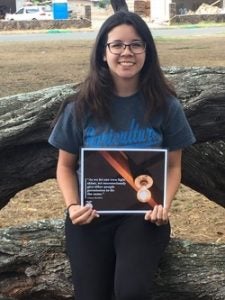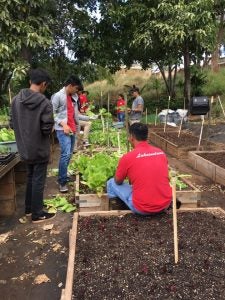While most Northerners dream of a vacation off the farm to soak up the sun and relax on the Aloha State’s beaches, a visit to one of Hawaii’s 7,000 farms probably wouldn’t be at the top of the tour list. But the state’s rich agricultural history is something Hawaii FFA is proud to show off.
“I think that being a state primarily founded upon agriculture has been an asset for FFA in terms of reconnecting to our communities,” said Zoe Tengan, Hawaii FFA President. “Most of the people from Hawaii immigrated here to work on sugar and pineapple plantations, and promoting that same sense of inclusion and diversity within FFA is really important in promoting agriculture again.”
Tengan was born and raised in Mililani, Hawaii, a rather suburban city that used to be a pineapple plantation. While none of her family members has a direct background with farming, her grandfather used to work for Dole Cannery.
Currently a freshman at the University of Hawaii at Manoa studying environmental design, Tengan said she will probably minor in plant production or natural resources management as well. After all, it was through a natural resources class at Mililani High School and encouragement from the teacher and FFA advisor that she continued her studies in natural resources and eventually joined FFA.

“I had previously seen various plaques and awards hung on the wall and the amazing projects that prior FFA members had done and I was intrigued. Since then, I had become heavily involved with FFA as well as other extra-curricular and decided to take the leadership I gained from the conferences I attended and run for state office,” Tengan said. “After getting the amazing opportunity to visit Washington, D.C., and experience outer island state conventions, I decided that I would give back to the members and advisors that supported me by serving as their state officer.”
According to Jackie Akuna Hawaii FFA executive secretary, the 700 member, 13 chapter organization mainly promotes FFA at the school level due to the state’s physical geography. The state association also promotes FFA through the legislative sessions where members make presentations and meet with representatives.
“Some of the goals for Hawaii FFA is to promote Hawaii FFA outside of the school level — we need to be seen more,” Akuna said. “We would also like to be able to complete more community service projects together as an association.”
As Tengan points out much of Hawaii’s agricultural landscape has now been developed for housing as the population, especially on Oahu, has increased exponentially. Most of Hawaii’s chapters are situated in the heart of urban or suburban development and thus play an even more significant role in raising awareness of the diversity of agriculture and how it can be integrated in an urban setting.
“On Oahu, most of our chapters participate in the annual Hawaii State Farm Fair that is opened up to the public and gives agriculturists and environmentalists a platform to showcase their achievements, 4-H animals, and a better understanding of the agriculture industry presence here. Within individual chapters, Mililani FFA, McKinley FFA have volunteered at Keiki in the Kitchen which allows for local farmers to market their products and for young and up-and-coming chefs to demonstrate their skills,” Tengan said. “Lahainaluna FFA on Maui has participated in various plant and produce sales for their community, chapters from the island of Hawaii has continuously marketed their produce, and participated in the Puu Waa Waa Reforestation Camp, where they’ve helped the native species of plants and animals flourish.”
While Tengan said many chapters throughout the state have achieved wonderful things in their community, she especially gives credit to Lahainaluna FFA.

“Despite continuously performing exceptionally well throughout the years, they have really stepped up in terms of service. Over this past year, they’ve held various sales and small fairs promoting their own produce as well as promoting agriculture to their community,” Tengan said. “They’ve participated in the Food and Wine Festival in October, Maui County fair, and have had multiple fundraisers to fund trips and their travels costs for the state convention. They’ve done an exceptional job in promoting their own chapter on social media, and have stepped up their performance in CDE’s as well.”
This year Hawaii FFA plans to focus on letting members know what FFA has to offer after high school, especially with the addition of new chapters this year. Other plans include starting an alumni chapter and hopefully increasing fundraising efforts for future state conventions.
After Tengan’s term is over, she plans to become an active alumni member herself.
“I will want to continue to visit FFA chapters and share my own experiences and help students with their SAE’s or CDE’s. I will most likely visit their competitions and judge their contests if so needed,” Tengan said. “I would also really like to start up a collegiate chapter at my university if possible and encourage other alumni to participate. I would also find out about alumni chapters and see if that could become a statewide option for other alumni to participate as well.”
Both Tengan and Akuna hope Hawaii FFA members truly see the value in their participation in the program.
“We hope that our FFA members take away some knowledge and skills that they can use in the real world,” Akuna said. “Being able to complete hands-on tasks, and working together as a team are great resources to have to either enter college or pursue a career.”
“I hope that Hawaii FFA members will understand that no matter what career choice or where they go, that FFA will leave a better understanding of agriculture which can often be misunderstood in a technology-driven world,” Tengan said. “I hope that they will understand the significance of their involvement in FFA and understand that being interested in agriculture is something to be proud of because it honors everything Hawaii represents, from diversity to the Aloha spirit.”
Tengan highly encourages more students to join FFA because it’s an experience of a lifetime no matter how many years you participate in it.
“Living in Hawaii is very special and unique and for students, being connected to our ancestors and their direct involvement with agriculture is something that everyone can benefit from,” Tengan said. “Whether their ancestors were originally from the islands or immigrated here to work on the plantations, every student can feel that same passion and drive that they’ve had in agriculture, and FFA offers that same type of experience and connection that can’t be obtained in ordinary classrooms.”


